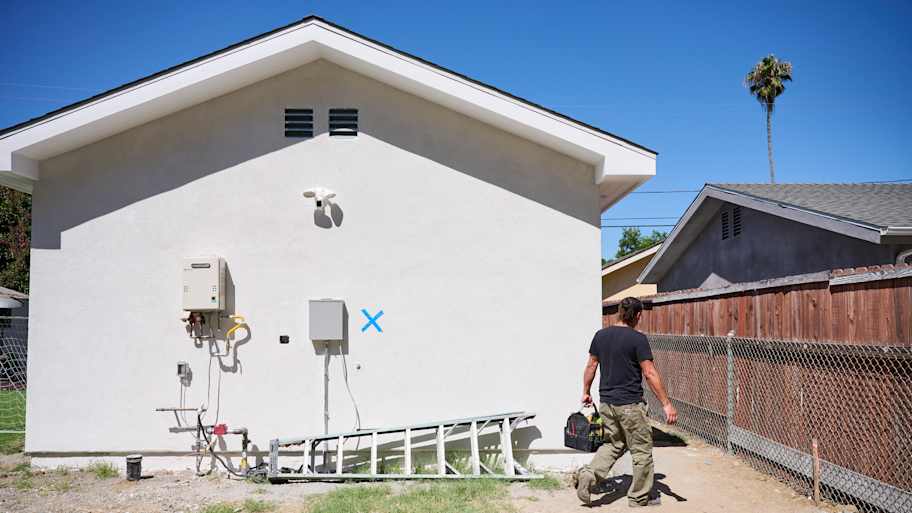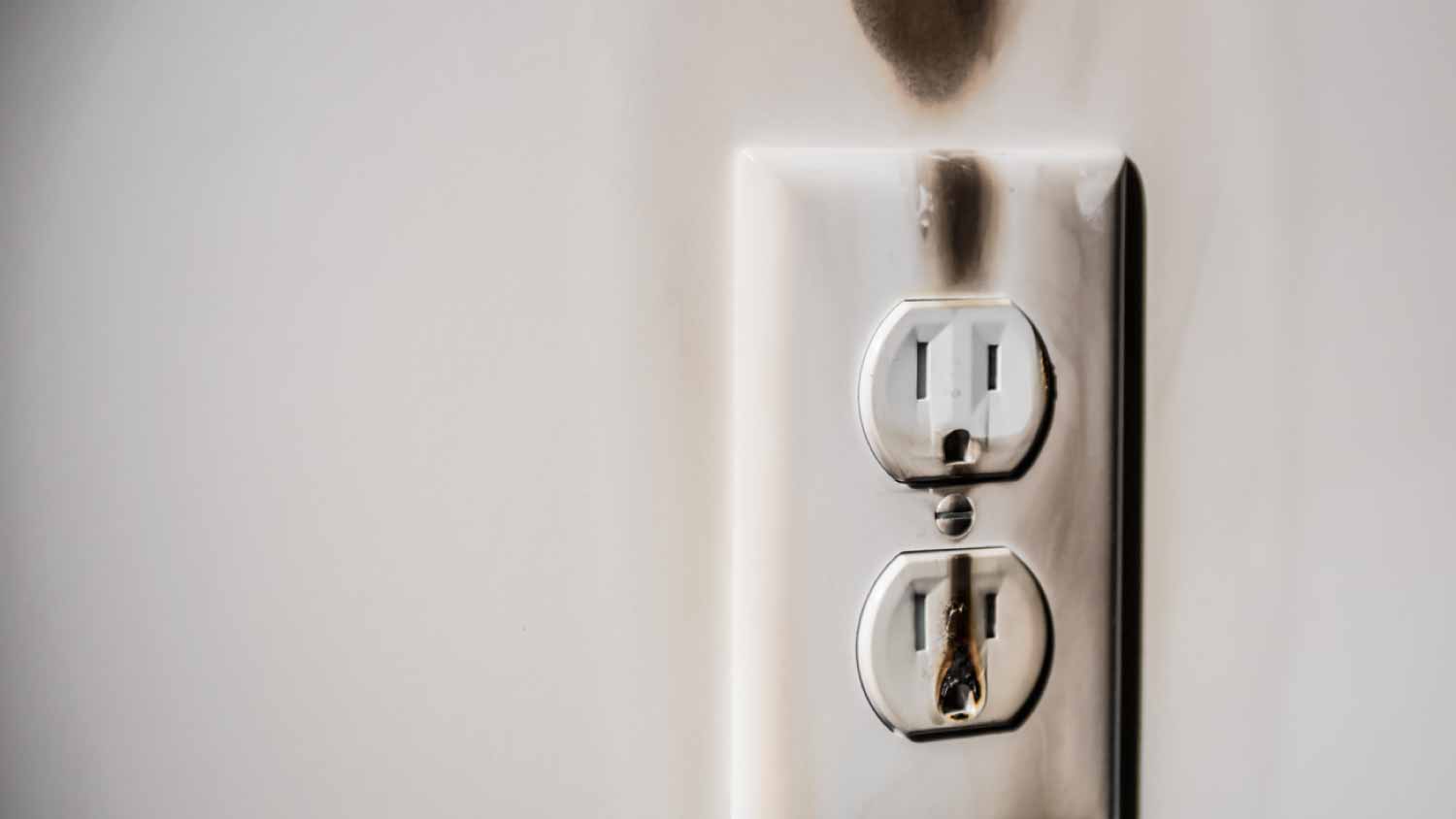5 Reasons Your Outlet Sparks When Plugging in Appliances, Devices, and More
This won’t come as a shock, but sparking outlets can be a big deal


Sparks from electrical outlets could point to a short circuit, damaged wiring, or other issues.
Overloading a circuit, old outlets, and improper installation could all cause outlet sparks.
Short, quick sparks when plugging in a device are normal, but frequent and continuous sparks need to be examined by a qualified electrician.
If an outlet is sparking, immediately shut it off, discontinue use, and call a pro.
If you notice that an outlet sparks when plugging in chargers, lamps, or anything else in your home, listen up. When your electrical outlets are sparking, it could be a sign that there’s something wrong, like excess moisture or an overloaded circuit. Plus, it’s a major hindrance to everyday life, especially if the sparking outlet is one you use all the time. Here's what you need to know about electrical outlets, why they spark, and when it’s time to call an electrician.
Normal Outlet Sparks vs. Bad Outlet Sparks
The power running through your home’s wiring delivers the energy needed for modern technology and appliances, but it can be dangerous if not properly maintained. Electricity is complex, and sparks aren’t always a concern—see what’s normal and what deserves a second look below.
Normal Outlet Sparks
Outlets sometimes emit a small spark when you plug in an appliance. This spark is typically normal and similar to static electricity. When you plug an appliance or other device into an outlet, some of the power moves into the device. When the energy suddenly diverts, there’s a quick draw on the available power, causing a brief spark. But if a sparking outlet concerns you, don’t hesitate to call an electrician near you.
Dangerous Outlet Sparks
In some cases, outlet sparks can be dangerous, so it’s important to be aware of the warning signs. If you notice a spark that persists, fizzles, appears white or yellow instead of blue, emits a burning smell, or is large, it's time to stop using that outlet and contact an electrician. These types of sparks could indicate problems such as short circuits, overloaded outlets, worn-out components, or faulty installation.
1. Overloading
A circuit overload occurs when you try to draw more electrical current than the circuit can handle. When you overload a circuit, the electrical wiring becomes overheated, which can damage the insulation around the wires and create a fire hazard.
Overloading can also cause appliances and electronics to malfunction or even fail completely. If you notice that your circuit breaker is tripping frequently or if you smell burning around electrical outlets or appliances, it's important to address the issue immediately to prevent electrical hazards.
2. Short-Circuiting
Short circuits in an outlet’s wiring can have many causes, including old appliances and devices, loose connections, punctured wiring, and moisture. When one of these culprits impacts a circuit, an electrical current will start to move quickly along a path where it typically doesn’t belong, leading to way too much current flowing in the circuit. This can damage or even destroy the outlet’s electrical components, leading to, you guessed it, sparks.
In many homes, damaged or outdated appliances cause a lot of short circuits. Some appliances trip circuit breakers more often than others (looking at you, 10-year-old hairdryer), so if you notice a certain device is short-circuiting your outlet a lot, it might be time to call in a pro.
3. Moisture
Water can cause an outlet to spark and short out. The National Electrical Code® requires builders and electricians to install a special outlet known as a ground fault circuit interrupter (GFCI outlet) on any outlets that are within 6 feet of a water source. A GFCI will shut down a circuit as soon as it senses an irregularity in the power flow. This protects you from electrical shock and decreases the risk of an electrical fire in your home.
4. Old Outlets

Outlets gradually wear out over time. As the years pass, the connections will loosen, increasing the chances that a short circuit will occur and start a fire. Appliance cords that are old and worn can also cause an outlet to spark.
5. Improper Installation or Repair
Improperly installed or repaired outlets can lead to a range of safety hazards and electrical problems. For example, if an outlet is not grounded or the grounding wire is not connected properly, it can increase the risk of electrical shock. Similarly, if an installer hasn’t connected wires securely or the wires are frayed, it can cause electrical arcing, which can damage the wiring and create a fire hazard.
When someone who is not trained or licensed to work with electrical systems repairs your outlets, it can lead to more serious issues. The results can range from electrical equipment failure to loss of data and more. This is why it's extremely important to know the different types of electricians and to hire one who is qualified and licensed to repair electrical outlets.
On top of all of this, if someone has not installed the outlet in compliance with building codes or manufacturer specifications, you could run into problems with your home warranty. And, like all the previous problems, it can create a whole host of safety hazards that may not be immediately obvious.
Cost to Repair Sparking Electrical Outlets

The cost to repair an electrical outlet for any given issue generally ranges from $60 to $250, and the average price is $130. Unfortunately, issues related to sparking tend to be more expensive to fix. Expect sparking-related repairs to cost between $100 and $350 per outlet.
The good news is that not all sparking outlets require repairs. It’s normal for an outlet to spark occasionally when plugging in an appliance. If an outlet consistently sparks or sparks for an extended period of time, then it’s cause for concern. You’ll likely need to hire a professional for the job unless you have experience with electrical work.
DIY vs. Hiring a Pro
We recommend hiring a local electrician for any electrical issues. Without sufficient experience, a DIY repair may worsen the issue and harm the individual trying to fix the outlet. A sparking outlet is especially dangerous and not worth the risk. Instead, hiring an electrician guarantees the job is done safely and correctly, even if it costs extra.
If you have the expertise to repair a sparking outlet yourself, the primary benefit is that you’ll save money. Electricians typically charge an hourly rate of $50 to $130, and many have a service call fee between $100 and $200 for the first hour of work. As a result, labor costs are the primary expense when repairing an outlet, whereas DIY repairs only require you to pay for new parts.
For homeowners looking to hire an electrician, contact one in your area to discuss the issue and get a quote. Most repairs aren’t urgent, but you can contact an emergency electrician for immediate assistance if needed.
Frequently Asked Questions
A sudden tiny spark is normal when first plugging in an appliance. However, if your plug regularly sparks, has other concerning problems, or worries you for any reason, you should call a licensed electrician to have it inspected and ensure that it is not at risk of causing an electrical fire.
No, it is not safe to use an outlet that sparked. A spark from an outlet could indicate a short circuit, loose or frayed wiring, or other serious damage. Continuing to use an outlet that sparks can increase the risk of electrical shock, electrical fires, and other hazards. It's important to turn off the power to the outlet at the circuit breaker if possible and avoid using the outlet until a licensed electrician has inspected and repaired it.
Yes, if something sparks when you plug it in or turn it on, it's important to unplug it immediately. A spark from an electrical appliance or device could indicate a short circuit, damaged wiring, or other electrical problems that could cause electrical fires or electrical shock. By unplugging the appliance, you can reduce the risk of electrical hazards and prevent damage to the device itself. It's important to avoid using the appliance until it has been inspected and repaired by a licensed professional to ensure that it’s safe to use.





- Home Generator Repair
- Lamp Repair
- Electric Repair
- Generator Installation
- TV Antenna Services
- Emergency Electricians
- Commercial Electricians
- Attic Fan Installation
- Attic Fan Repair
- Exhaust Fan Installation
- Electric Inspectors
- Subcontractors
- Electrical Construction
- EV Charger Installer
- Chandelier Installation
- Doorbell Installation
- Bathroom Fan Installation
- Ring Installers
- Electrical Panel Upgrade

 - Derek Rose.png?impolicy=thumbnail)









